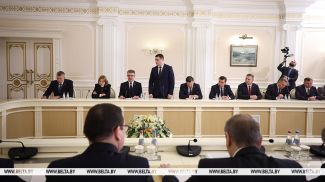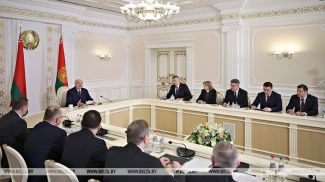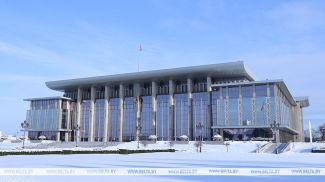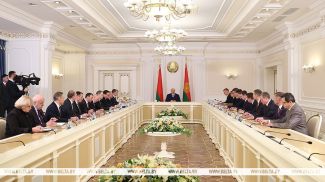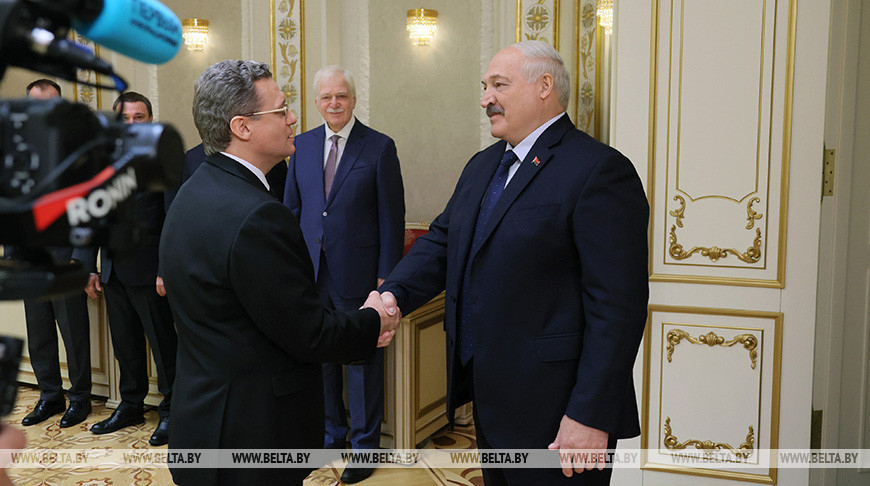
MINSK, 25 August (BelTA) – Belarus President Aleksandr Lukashenko mentioned the similarity of the two Slavonic nations – the Belarusian one and the Russian one – as he met with Governor of Russia’s Vologda Oblast Georgy Filimonov on 25 August, BelTA has learned.
The head of state started his meeting with the head of the Russian region by mentioning a well-known song by the music band Pesnyary. The president described them as a Belarusian-Russian music band. Thanks to Pesnyary’s Vologda song many people in Belarus and not only in Belarus associate the Russian city of Vologda, the region and its residents with this song. “Thanks to, one can say, the Belarusian-Russian music band Pesnyary among other things you have become the most recognizable and close people for Belarus. We are glad about it,” Aleksandr Lukashenko said.
He explained why he had mentioned this music band and what role the history of its development had played in the period since the collapse of the Soviet Union. “We had to revive this music band. Few talk about it nowadays. But in the days of rampant nationalism in Belarus (after all, it was all the rage in Belarus for several years, a couple of years before the president was elected) some people tried to reject all the Russian things. They rejected them and [tried to] force the society to reject them. But as you can see, the society did not welcome this message,” the president stressed.
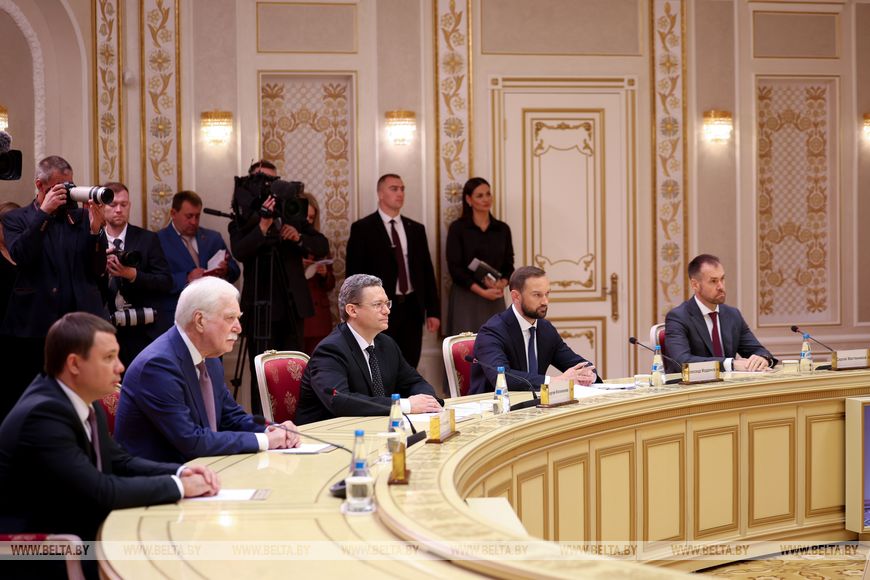
Aleksandr Lukashenko said that at the beginning of his presidency he met with members of the music band and knew the band’s leader Vladimir Mulyavin well. In that complicated artistic period Vladimir Mulyavin was desperate for assistance with getting back onto the stage. “Certainly, we did everything for the sake of Pesnyary’s return,” the head of state said. He remarked that the Vologda song performed by Pesnyary is well-known and loved both in the city itself, in the oblast, and in Belarus. “Entire Russia and Belarus know and love Pesnyary’s art, including this seemingly simple song that has become a great one. Indeed, all the great things are found in simple ones,” the Belarusian leader noted.
Addressing Georgy Filimonov, the president remarked that it was his first visit to Belarus and one can describe it as a big oversight. “A nuisance. How so? You are close. Kindred people. And it is the first time you’ve come to Belarus. But I think it is only the beginning and when you visit Moscow or some place closer to us, you will always find the time to visit Belarus,” he added. “And in addition to reminding us not only about great Vologda Oblast and about yourself (it is also important) but one more time you will also review how the agreements you and I will reach are being fulfilled after all.”
The head of state assured that there should be no problems with that on the Belarusian side. He drew attention to key factors, thanks to which this interaction is getting built on a solid foundation and is reliable and long-term. “First of all, the gratitude to oblast governors for the cooperation we enjoy today. Without you this cooperation would not exist. Particularly in the past. The days of old were not as simple and as bright for our relations as they are now. Indeed, troubled times bring people together. I guess Belarusians and Russians as well. And leaders of our states,” Aleksandr Lukashenko said.
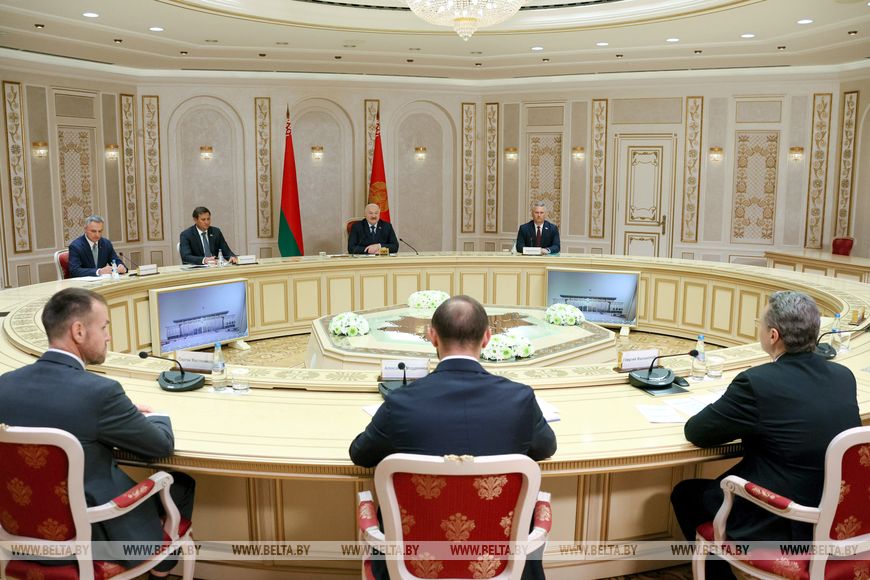
The Belarusian leader emphasized the importance of cooperation with Russian regions, including from the central part of that country. “Secondly, cooperation with you is very important for us,” he stressed. “Our nation’s respect for the Russian nation is great. As a Soviet man it is even difficult for me to say Russians and Belarusians… We are essentially one nation. We originated and were born from the same root. We are absolutely similar to each other. We have the same principles. We develop in a manner in which Slavonic nations are supposed to develop. We would like to have the kindest and warmest relations between us.”
In turn, Georgy Filimonov thanked the Belarusian head of state for saying such “important, warm, correct, programmatic” words that encourage productivity at the beginning of the meeting. He confirmed that indeed it was his first visit to Minsk and he felt at home. “Yes, we are representatives of the same tree, of the same Slavonic superethnos, carriers of the same historic and cultural code. We have a common legacy, a common Victory. We are meeting in the year of the 80th anniversary of the Great Victory. And we highly appreciate the heroic deed of our forefathers, who created the very possibility for us to live, to birth kids, to develop, and pass on this legacy from generation to generation,” Georgy Filimonov stressed.
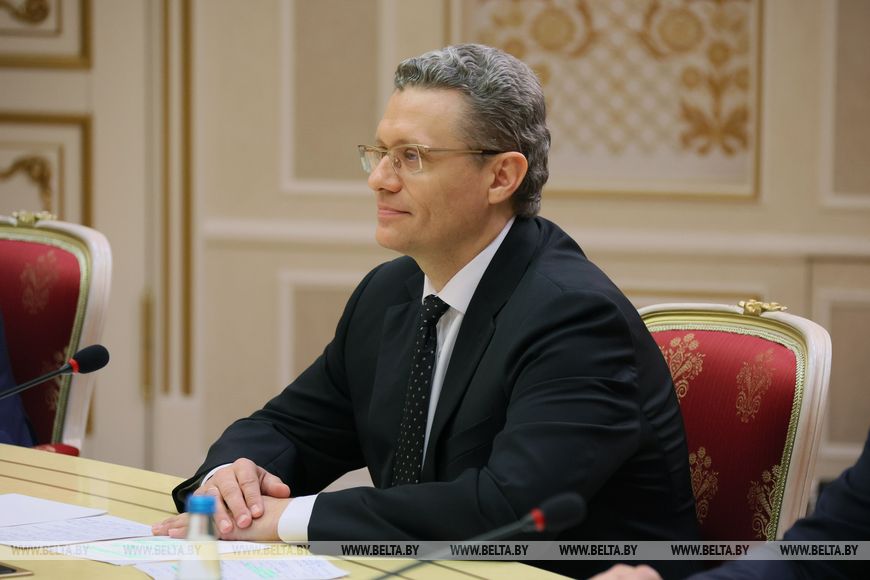
In his words, this commonality can be described as the Soviet legacy the way the Belarus president did it and Georgy Filimonov shares the opinion. “I also often stumble when someone drops hints for me or when I am forced to make clichéd diplomatic phrases, to curtsey and call Belarusians foreigners. I cannot do it even inside me,” the Vologda Oblast leader said.
“You and I together with our Belarusian colleagues, brothers, and comrades-in-arms defend the historic truth, fight for freedom, for historic justice. And we are winning. I am convinced that we will secure a victory in every sense,” Georgy Filimonov stated.




